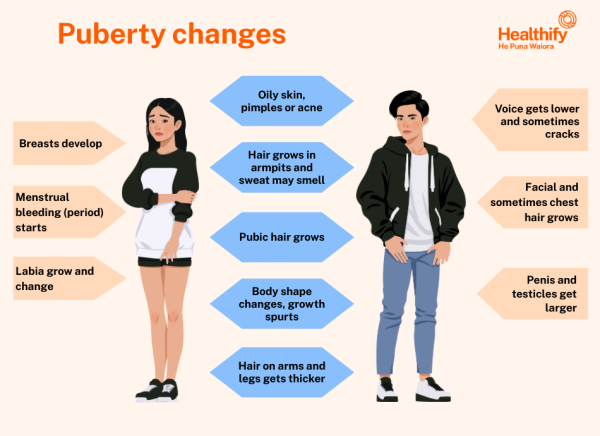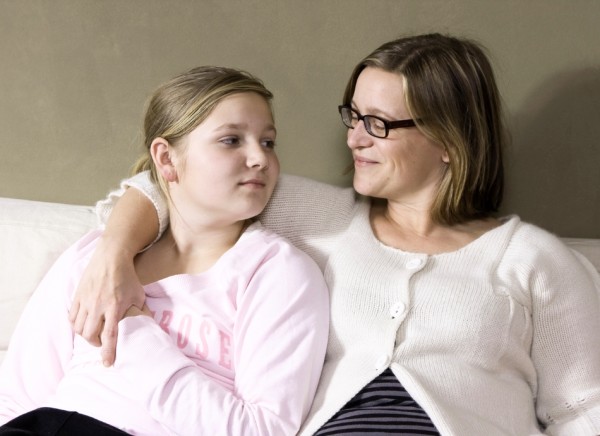Puberty
Puberty information for parents and caregivers
Key points about puberty
- Puberty is the process of a child's body maturing into an adult body.
- Changes in puberty are both physical and emotional, and are driven by hormones.
- The average age of puberty starting is 10 to 11 for girls and 11 to 12 for boys.
- Puberty can start between 8 and 13 in girls and 9 and 14 in boys and still be considered normal.
- If you’re worried that your child is starting puberty early or late, talk to your healthcare provider.

Puberty is the time when your child goes through physical, social and emotional changes on the way to becoming an adult. Puberty begins when the brain stimulates the body to release sex hormones– it’s nature’s way of preparing bodies for reproduction.
Changes in the brain start about 2 years before outside signs can be seen. Changes to reproductive organs (ovaries and testes) begin and then visible signs appear, such as:
- pubic and underarm hair growth
- breast and genital development
- menstruation (periods)
- growth spurts
- changes in body shape
- sweat production
- acne
- voice changes.
With an influx of hormones tamariki may become more self-conscious about their body. They may experience intense mood swings from very upset to happy to angry. They also draw closer to their friends and may start to form their own opinions about various aspects of life.
Puberty usually starts at about 10 to 11 years of age for girls and 11 to 12 for boys. However, anywhere between 8 and 13 for girls and 9 and 14 for boys is normal.
Every child is different and there’s no way of exactly knowing when your child will start puberty. Even children in the same family may not start puberty at similar ages.
Early puberty
Puberty is said to be early if it starts before:
- 8 years in girls
- 9 years in boys.
Early puberty (sometimes called precocious puberty) is more common in girls than boys. It may just ‘run in the family’, but occasionally it can be caused by an underlying condition, hormonal imbalances or even being overweight. Starting puberty earlier than their friends can come with challenges for your child such as:
- feeling self-conscious
- being treated as older than they are
- being teased
- seeming tall or ‘big’ for their age then suddenly stopping growing
- being more likely to have sexual feelings they might not understand.
If you notice signs of early puberty in your child, it’s important you talk to them about what’s happening and answer any questions they have.
Late puberty
Puberty is said to be late if there are no signs of puberty by:
- 13 years in girls, or if girls show other signs of puberty but haven’t had their first period by 16 years
- 14 years in boys.
Late or delayed puberty is more common in boys. Once again, it may just be something that runs in your family. If you or other family members started puberty late, it’s more likely your child will too. Puberty can also be delayed by things such as not eating well, having an eating disorder, or being very stressed. Sometimes, long-term illnesses, hormone problems, or genetic issues can cause late puberty, but these are less common.
Whether your child is starting puberty early or late, talk to them and find out how they are feeling. If you’re worried or have questions, start with a visit to your healthcare provider.
The changes listed can happen at different times for different people, and that's normal.
Physical changes in girls
- Breasts start growing, usually around 10 to 11 years of age. This is often the first visible sign of puberty. Each breast may grow at different rates and may not be the same size.
- Girls have a growth spurt, growing on average about 5 to 20 cm taller. They usually stop growing at 16 to 17 years of age.
- Body shape changes, with hips getting wider.
- Pubic hair starts to grow and gets thicker over time.
- At about 12 to 14 years of age, hair starts growing under the arms and on other parts of the body.
- A clear or white vaginal discharge begins a few months before periods start. The discharge is usually not itchy and does not cause any discomfort.
- Periods usually begin about 2 years after breasts start growing but may not start for up to 4 years. Read more about periods.
Physical changes in boys
- Boys get taller and start developing more muscle.
- Their voice starts to get deeper. The process is usually gradual and there maybe some jumps between high and low sounds, and ‘squeaks’. The change is due to their larynx (Adam’s apple) getting larger.
- Genital changes gradually take place – testicles start to produce testosterone and sperm, and penises grow but not all to the same size. The size doesn’t affect how they work. Testicles may be uneven in size and one can hang lower than the other.
- Boys may ejaculate while sleeping – this is called a "wet dream." It happens when they’re sexually aroused, even if they don’t remember it. Random erections during the day are also normal.
- Extra hormones can make skin oilier, leading to pimples or acne.
- Sweat increases and can be smelly.
- Hair starts growing under the arms, around the pubic area, and eventually on the face (upper lip and chin). Hair on arms and legs increases.

Image credit: Healthify He Puna Waiora
Intersex variations
People with intersex variations are born with physical traits that don’t fully match typical definitions of male or female bodies. These differences might affect their genitals, making them look different from what’s expected for boys or girls. Some differences aren’t visible, such as variations in internal organs, chromosomes, genes, or hormones.
Intersex variations might not be identified until your child starts puberty, or if their body develops in a way that’s different from what you might expect. Talk to your healthcare provider if you or your child has any concerns or questions about how their body is changing.
Read more about differences in sex development.
Mood changes
As well as physical changes, puberty can cause changes in how your child acts. They might relate to family and friends differently.
Emotional changes:
- They may face issues to do with their sexuality, gender identity and mental health.
- They'll want to spend more time with friends, not with you.
- They may become interested in dating.
- They might worry more about their looks.
- They might want more responsibility, freedom and independence.
- They might feel frustrated when things don't go their way, which can lead to negative feelings and behaviour.
You might also notice:
- mood swings and intense feelings
- changes in energy levels
- different sleep patterns.
These changes can make your relationship with your teen challenging at times. Have a look at the support for parents section below.
- Talk to your child about the body changes they're going through and make sure you’re open to their questions and help them create good hygiene habits.
- Teach them about sex, including how important it is to get consent and stay safe.
- Help them feel better when they're scared or confused about growing up.
- Show them how to be happy with their body and live healthily, eg, be a good role model for healthy eating, regular exercise and good sleep habits.
- Give them more space and freedom but still keep them safe and set rules when needed.
- Accept them for who they are becoming and support them in their choices.
How to handle arguments
Changes at puberty can mean your child struggles to manage their emotions. It's normal to argue more with your child during their teens because:
- they want to be independent
- they're figuring out who they are
- they might question your opinions
- mood swings play a part.
It’s important to remember:
- They're not trying to upset you on purpose.
- They might not realize how their words affect you.
- Arguing with you is a sign that they’re maturing and exploring new ideas and emotions.
Even when your teen is upsetting you or making you angry, try to stay calm and acknowledge their feelings:
- Listen to them without interrupting.
- Try to see things from their point of view.
- Share your feelings and explain how their actions affect you.
- Admit when you're wrong and apologize.
- Keep your rules but let them have some freedom in a safe way.
This will help them learn how to communicate and understand emotions better.

Image credit: Depositphotos
If your child is violent or aggressive, try not to lose your temper and respond in the same way. Stay calm but let them know that violence towards anyone isn’t acceptable. If your child is non-verbal, look for resources that can help them express how they’re feeling or ask if they need some time alone.
If you’re worried or concerned about your child’s behaviour, consider talking to your healthcare provider, school counsellor, teacher or a mental health professional.
Trans or gender-diverse children
Children who are trans or gender-diverse will go through the same sorts puberty-related changes as their peers, unless they’re taking puberty blocking hormones. Some may feel fine about their body changes; others may find them distressing and they may experience gender dysphoria (when they feel their gender identity doesn't match the sex they were assigned at birth). Read more about gender dysphoria.
Keeping talking about what’s going on for them and how they’re feeling. Ask about how they want to express their gender as their body changes. You may not have all the answers to the questions they have so you may need to find out and get back to them later. Read more about puberty and trans or gender-diverse children and how you can support them(external link).
Apps reviewed by Healthify
You may find it useful to look at some puberty apps and mental health and wellbeing apps (for teenagers and young people).
Parenting teens – the teenage brain(external link) KidsHealth, NZ
How to talk about puberty (boys)(external link) The Parenting Place, NZ
How to talk about puberty (girls)(external link) The Parenting Place, NZ
Young people’s and children’s mental health(external link) Royal College of Psychiatrists, UK
The following links provide further information about puberty. Be aware that websites from other countries may have information that differs from New Zealand recommendations.
All about growing up(external link) Sexual Wellbeing Aotearoa
Stages of puberty in boys(external link) Kidspot, NZ
Stages of puberty in girls(external link) Kidspot, NZ
Pre-teens – puberty and sexual development(external link) Raising Children, Australia
What happens during the stages of puberty?(external link) innerbody, US
Brochures
Changes at puberty – a guide for parents and carers(external link) Parent to Parent, NZ, 2021
Apps
Puberty apps
Mental health and wellbeing apps (for teenagers and young people)
References
- (external link)Stages of puberty in boys(external link) Kidspot, NZ
- Stages of puberty in girls(external link) Kidspot, NZ
- Helping your child through puberty(external link) Healthdirect, Australia, 2023
- Physical changes in puberty(external link) Raising Children, Australia, 2024
- Puberty – when it’s early or late(external link) Raising Children, Australia, 2024
- Intersex variations – babies, children and teenagers(external link) Raising Children, Australia, 2025
- Early or delayed puberty(external link) NHS, UK, 2022
- Changes at puberty(external link) Parent to Parent, NZ, 2021
Credits: Healthify editorial team. Healthify is brought to you by Health Navigator Charitable Trust.
Reviewed by: Tracey Xu, Nurse Practitioner, Emergency Department, Hutt Hospital, Wellington
Last reviewed:





